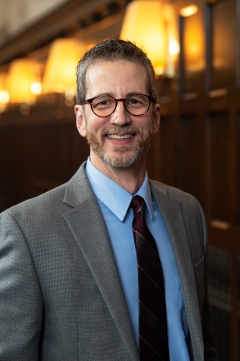About the Curran Center
Our Goals
We believe the study of Catholicism provides a powerful lens through which to view human experience and the American past and present. Acting on this conviction, our programming aims to:
- Promote the understanding of Catholic thought and practice
- Explore Catholicism’s diverse manifestations in American contexts
- Create opportunities for informed and compassionate engagement with the religious and social issues of our time.
Director's Welcome

Otro mundo es posible. Another world is possible. It is a saying I’ve heard in Puerto Rico among those who have survived hurricanes and are resisting the ongoing colonial reality of the island. I’ve heard it in El Salvador among activists who have survived a civil war and gang violence and who are trying to keep mining corporations from despoiling their lands. I’ve heard it in the Bronx where community gardens and organizing provide a glimmer of hope beyond the old status quo of marginalization and violence.
At the Curran Center, we are committed to the notion that another world is possible, and adding to it, that another church is possible too. This is not said to reject the church as we know it, but to acknowledge that as a People of God on pilgrimage, we are continually called to renewal by responding to the changing signs of our times.
We serve Fordham’s mission as the Jesuit university of New York City. In this node to a global network, we realize that our study of American Catholicism must include all of the Americas. Our scholarly and interdisciplinary lectures, conferences, seminars and publications all contribute to the goal of serving as a critical conscience (con-sciencia = with science) to the academy, church, and society.
Our most concrete vision of hope comes in the remarkable students who pursue the Catholic Studies concentration here at Fordham. Their intellectual acumen and creativity, their deep sense of compassion and solidarity, and their unflagging efforts for justice across a range of issues and locations; these all give us confidence that yes, another world is possible.
Whether you are able to attend one of our events in person or remotely, we invite you to explore this website and join us in whatever way you can. Your participation, your support, and yes your thoughts and prayers all contribute to our hope that another world is possible.
Cuídense,
Michael E. Lee
Director, The Francis and Ann Curran Center for American Catholic Studies
-
In 2001, university president Rev. Joseph O'Hare, S.J., approached Rev. Mark Massa, S.J., about forming a center for the study of American Catholicism. In the following months, Fr. Massa set to work developing Fr. O'Hare's vision, in hopes of establishing a nationally-recognized hub for the study of American Catholic history, identity, and practice.
In 2004, John and Connie Curran expressed to Fr. Massa their interest in endowing the center, and the Francis and Ann Curran Center for American Catholic Studies, named in honor of John's parents, was born. Dedicated to advancing the Jesuit Catholic educational mission of the university, the Curran Center is a hub for many different types of events and programs, including public lectures, faculty seminars, major scholarly conferences, and an undergraduate concentration that, in the words of our students, shapes the way Fordham students "see and engage the world."